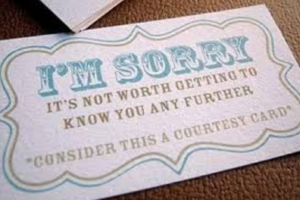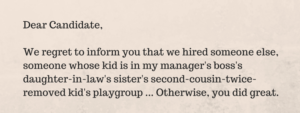 Here’s a question that has been on my mind: Why don’t we send out rejection letters anymore?
Here’s a question that has been on my mind: Why don’t we send out rejection letters anymore?
I know — your company sends out rejection letters, and if they do, congratulations because I believe that puts you in the minority of companies that still think it matters to do the right thing and let job candidates know they didn’t make the cut.
But, I also know firsthand how bad some recruiters, hiring managers, and their organizations are at giving applicants a professional and courteous kiss off. That’s because I spent a good chunk of the past year (before my current gig at RecruitingDaily) applying to all sorts of jobs, and in my humble experience, I got an official rejection from very few of them.
To put some hard numbers to it, I applied for 57 jobs over a 10 month period. Most of them were for editing positions that I was very qualified for — Senior Editor, Director of Content, Managing Editor, and jobs like that — but despite my many years as a top editor in newspapers, magazines, and online, I only got one interview and I’m still waiting for a final rejection on that even though they hired somebody else back in May.
Would you believe a 12% rejection letter rate?
Mostly, I heard crickets and pretty much got nothing back in response. Overall, I received a whopping seven rejection letters — 12 percent.
A few years back, Mental Floss published a blog post about 10 Rejection Letters Sent to Very Successful People. Just the names of those who got rejection letters should make you sit up and notice: Bono, Andy Warhol, Kurt Vonnegut, Tim Burton, Steig Larsson (author of The Girl with the Dragon Tattoo), and Hunter S. Thompson, among others.
The BBC posted a similar article last month titled 8 Rejection Letters That Will Inspire You Not to Give Up that dug into an equally impressive list of music celebrities — Madonna, Kurt Cobain, Nina Simone, Nick Cave, and Dave Grohl from Foo Fighters — who all got a kiss off letter sometime in their career and consider themselves better for it.
I’m always amused by rejection letters in general because they seem to reconfirm what we already know — that people who are paid to assess and measure talent frequently get it very, very wrong.
Corporate America stinks at responding to candidates
 Yes, I have first-hand evidence that tells me this is true: people who evaluate talent frequently and repeatedly get it so wrong that you wonder sometimes how they manage to keep their jobs. And, the Mental Floss and BBC articles simply make this point again by showing us how people who we know today to be great talents got rejected once, too.
Yes, I have first-hand evidence that tells me this is true: people who evaluate talent frequently and repeatedly get it so wrong that you wonder sometimes how they manage to keep their jobs. And, the Mental Floss and BBC articles simply make this point again by showing us how people who we know today to be great talents got rejected once, too.
But there was something else that jumped out at me from this article: who actually gets a real, live rejection letter anymore?
Today it’s very rarely an actual letter and more likely a rejection email you’ll see, and even those can sometimes go terribly wrong. But, most people today get no rejection at all — no letter, no email, no nothing.
In fact, job applicants are lucky to get more than a simple acknowledgement that they applied for a job, much less a rejection, as my 57 job applications with only a 12 percent rejection letter rate seems to confirm.
Gerry Crispin and Mark Mehler, who run Career Xroads, have researched this for years, and the sad fact of the matter is that their work shows that a great many companies on Fortune‘s 100 Best Companies to Work For list don’t even bother to send a rejection letter.
In other words, as bad as the people evaluating talent may be in doing their job, they (and their organizations) make it worse by not even being courteous enough to respond to those who took the time to apply.
Yes, Corporate America really stinks at responding to job candidates.
Hunter S. Thompson’s famous rejection letter
Say what you will about the traditional rejection letter, but it actually showed a degree of civility in giving applicants a final answer about their status. On top of that, rejection letters frequently fuel the recipient to work that much harder to do what they need to do so that they don’t get rejected the next time.
My guess is that many of those featured in 10 Rejection Letters Sent to Very Successful People reacted in that very way, and now view such letters as part of the fuel that pushed them to be so successful.
We’re a lot worse off in recruiting today by being so cavalier and pretty much taking the old-fashioned rejection letter out of the process.
McKeen, you s**t-eating freak. I warned you about writing that vicious trash about me.
Now you better get fitted for a black eyepatch, just in case one of yours gets gouged-out by a bushy-haired stranger in a dimly-lit parking lot. How fast can you learn Braille?
You are scum.
HST
Here’s how NOT to reject a candidate
Here’s my take: As with so many things going on today, the rejection letter has nearly gone away because civility and manners have nearly gone away for far too many people.
Recruiters and talent acquisition professionals like to whine that they’re simply overwhelmed by candidates, but even the automated responses they send out to candidates can come off as condescending and rude. For example, here’s an actual response that I got during my job search, and it’s a doozy:
As a courtesy, we wanted to let you know that the Managing Editor job with Ca*****o Media has been closed. As we open or identify other jobs that may be a good fit, we will be in touch.
Yes, this company actually wanted to make clear they were going out of their way and doing me a big favor by telling me that “As a courtesy … (the job) … has been closed.”
My reaction: When did it become such a big deal to be courteous and just do the right thing?
Let me break down how wrong this response is:
- They didn’t thank me for applying, or even tell me I didn’t get the job, or that they were hiring someone else.
- What they sent me as a response came off as condescending, rude, and wrong.
Is this what you want YOUR recruiters and TA professionals to be telling rejected candidates? Is this how you build a great organizational “brand?”
You know the answer to those questions.
 Yes, recruiting is a lot harder today, and the “fire hose effect” — also known as “drinking from the firehose” — makes it tough for hiring departments to handle the overwhelming number of resumes and applications that they get.
Yes, recruiting is a lot harder today, and the “fire hose effect” — also known as “drinking from the firehose” — makes it tough for hiring departments to handle the overwhelming number of resumes and applications that they get.
Lots of good candidates get lost in the shuffle, and all that great technology to handle applicants that I saw last month at HR Tech in Las Vegas doesn’t seem to get used properly by many companies who clearly are in need of it.
You want to check on how your recruiting department is doing in this regard? Get some of your people to test the system by creating a resume and applying for some jobs you’re trying to fill. I guarantee that if you do, a great many of you will be taken aback at how you’re treated. And, don’t be surprised in the end if you don’t get a rejection letter.
Yes, it’s all about that — treating people the right way, aka, The Golden Rule. Why do so many people in recruiting and hiring get that so wrong?
Authors
John Hollon
John Hollon is managing editor at Fuel50, an AI Opportunity Marketplace solution that delivers internal talent mobility and workforce reskilling. You can download the research reports in their Global Talent Mobility Best Practice Research series at Fuel50.
Recruit Smarter
Weekly news and industry insights delivered straight to your inbox.





